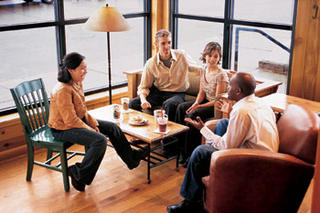Coffeehouses: Church for Postmoderns
 If you've visited a coffee shop lately (and living in any area with flora, fauna, and breathable air eminently qualifies your region for a Starbucks), you may have noticed an interesting trend. In an age when religion of the major denomination variety generally gasps in the dust, and in which personal spirituality thrives (meaning one can feel, not believe, anything they want--important distinction), something has to substitute for church. Feeling our inherent needs for fellowship, an appropriate setting, sharing of burdens, and enjoyment, many turn in full or in part to the coffee shop. It's not much of a stretch to say that for a good mass of people, the coffee shop is the replacement church of the 21st century.
If you've visited a coffee shop lately (and living in any area with flora, fauna, and breathable air eminently qualifies your region for a Starbucks), you may have noticed an interesting trend. In an age when religion of the major denomination variety generally gasps in the dust, and in which personal spirituality thrives (meaning one can feel, not believe, anything they want--important distinction), something has to substitute for church. Feeling our inherent needs for fellowship, an appropriate setting, sharing of burdens, and enjoyment, many turn in full or in part to the coffee shop. It's not much of a stretch to say that for a good mass of people, the coffee shop is the replacement church of the 21st century.A quick run-through of what churches and coffee shops provide reveals an eerie similarity in potential attendee experience.
1) Fellowship-This is an easy one. In the same way that church members form and perpetuate friendships, people develop camaraderie through their repeated visits to a coffee shop. Over time, one gets to know the regular rotation of staff and builds a rapport with them. One also sights fellow repeat customers and begins to build bonds with them. What begins as an addiction to a strange brown liquid, then, begets affection of a strange but lasting variety.
2) An appropriate setting- In much the same way that people shop for a church, looking generally for a friendly local body offering the product they desire, so do they prospect for a coffee shop to call home. Before settling on a store, one will visit several, sometimes bringing friends, sometimes going alone, always evaluating the environment, tasting the treats, and importantly, checking out the chairs. As with those masses of polled churchgoers who say they highly value comfortable seating, so too do prospective coffee-drinkers prize nice chairs.
3) Sharing burdens- As church members confide in, console, and encourage one another, so too do coffee-shop patrons provide a deeper level of relationship for one another. This category goes beyond mere fellowship, transcending it and passing into the realm of disclosure and direction. Staff members of the shop, in particular, seem to form some of their deepest friendships through the shop, in a way unique to employment settings. With its capacity for conversation and pleasant atmosphere, the coffee shop, like the church, invites such intimacy.
4) Enjoyment- Many church members derive enjoyment from their participation in congregational life. In a familiar environment, pretensions are discarded; laughter is had with familiar friends; and the worship life of the church presents much opportunity for enjoyment through hearing edifying messages, singing moving songs, and praying heartfelt petitions. Interestingly, the coffee shop experience strikingly parallels that of the church. As friendships form, patrons discard pretense; as familiarity emerges, laughter happens; in reading the paper, hearing good music (often something avant garde--except all coffee shops play it, so it's not avant garde anymore), one is encouraged and made happy. Coffee-shop mirrors church.
Those are some of the ways in which church can and has replaced the church experience for the postmodern. With such environments, the part of one's being that senses the absence of something vital, namely, communal involvement, is sated. How appropriate that instead of the Rotary Club or the Masons, past attempts at societal replacement of church, postmoderns enter their community by the door of materialistic satisfaction. One not only gets friends at the coffee shop; one gets an exquisite Mint Mocha Chip Frappucino, with a small reduction of life included in the four dollar tab. Yearning for people mixes with yearning for pleasure in the twenty-first century version of "involvement."
Despite all that has been noted here, none of this should be read in a tone of disdain. I can well understand why many people of today would place the coffee shop as their center of interaction. I myself frequently patronize coffee shops and have found some dear friends through them (in fact, Mom and Dad, I met this wonderful girl, and we're getting marr--just kidding). It merely fascinates me that coffee shops seem to play such a central role in the
 lives of many postmoderns. On that note, it saddens me that they do, because though for many the store is merely a store, a nice place to go, for others it is more. This hypothesis, which lurked in my mind for a long time, was confirmed for me recently when I was told by a patron that the shop, close to the patron's home, provided friendship, fun, and meaningful interaction. He had no church membership, no family, and few other places to go. The coffee shop truly was his place of community. Perhaps such stories will make one more sensitive to those patrons one regularly sees at the shop. In a place known for forming friendships, perhaps Christians can introduce others to a friend whose "product" of grace never runs out, whose fellowship does not cease, and whose covenant of love carries into endless ages uninhabited by the trees, the mountains, and yes, the Starbucks.
lives of many postmoderns. On that note, it saddens me that they do, because though for many the store is merely a store, a nice place to go, for others it is more. This hypothesis, which lurked in my mind for a long time, was confirmed for me recently when I was told by a patron that the shop, close to the patron's home, provided friendship, fun, and meaningful interaction. He had no church membership, no family, and few other places to go. The coffee shop truly was his place of community. Perhaps such stories will make one more sensitive to those patrons one regularly sees at the shop. In a place known for forming friendships, perhaps Christians can introduce others to a friend whose "product" of grace never runs out, whose fellowship does not cease, and whose covenant of love carries into endless ages uninhabited by the trees, the mountains, and yes, the Starbucks.

0 Comments:
Post a Comment
<< Home